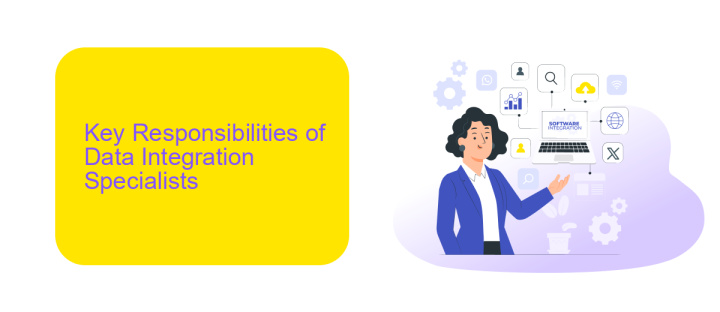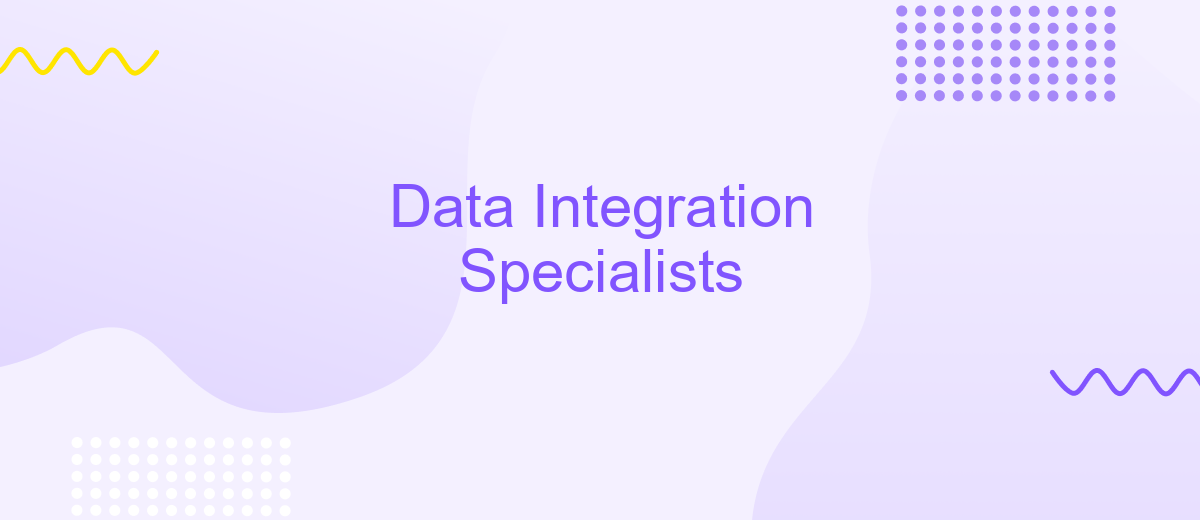Data Integration Specialists
In today's data-driven world, businesses rely heavily on seamless data integration to make informed decisions and stay competitive. Data Integration Specialists play a crucial role in merging disparate data sources into cohesive, actionable insights. Their expertise ensures that data flows efficiently across systems, enabling organizations to harness the full potential of their information assets for strategic growth and innovation.
Introduction: Defining the Role of Data Integration Specialists
Data Integration Specialists play a critical role in modern organizations by ensuring seamless data flow across various systems. Their primary responsibility is to integrate disparate data sources, enabling businesses to make informed decisions based on comprehensive datasets.
- Designing and implementing data integration solutions
- Managing data migration and synchronization processes
- Ensuring data quality and consistency
- Collaborating with IT and business teams to meet data needs
- Utilizing tools like ApiX-Drive for efficient integration processes
By leveraging platforms such as ApiX-Drive, Data Integration Specialists can automate and streamline the integration process, reducing manual effort and minimizing errors. This allows organizations to focus on strategic initiatives, confident that their data is accurate and up-to-date. As data continues to grow in volume and complexity, the role of Data Integration Specialists becomes increasingly vital to maintain operational efficiency and drive business success.
Key Responsibilities of Data Integration Specialists

Data Integration Specialists are responsible for designing and implementing data integration solutions that ensure seamless data flow between different systems and applications. They analyze business requirements and develop strategies to integrate data from various sources, ensuring data consistency and accuracy. These specialists work closely with stakeholders to understand their data needs and create custom integration solutions that align with business objectives. Additionally, they are tasked with monitoring and troubleshooting data integration processes to identify and resolve any issues that may arise.
Another key responsibility of Data Integration Specialists is to utilize tools and platforms, such as ApiX-Drive, to automate and streamline data integration tasks. ApiX-Drive allows specialists to connect various applications and services without requiring extensive coding knowledge, thus speeding up the integration process. They also ensure that all data integration solutions comply with data governance and security standards, safeguarding sensitive information. Continuous improvement is a critical aspect of their role, as they regularly update and optimize integration processes to enhance efficiency and performance.
Skills and Qualifications Required for Success

Data Integration Specialists play a crucial role in ensuring seamless data flow between various systems. They need a combination of technical skills and soft skills to succeed in this dynamic field.
- Proficiency in data integration tools and platforms such as ApiX-Drive, which simplifies the process of setting up integrations.
- Strong understanding of database management systems and data warehousing solutions.
- Experience with ETL (Extract, Transform, Load) processes and tools.
- Knowledge of programming languages like SQL, Python, and JavaScript.
- Excellent problem-solving skills and attention to detail.
- Strong communication skills to collaborate effectively with cross-functional teams.
- Ability to manage multiple projects and meet tight deadlines.
In addition to technical expertise, Data Integration Specialists must be adaptable and continuously update their skills to keep pace with evolving technologies. Familiarity with services like ApiX-Drive can significantly enhance their efficiency and effectiveness in integrating data across various platforms.
Career Outlook and Employment Trends

The career outlook for Data Integration Specialists is promising, driven by the increasing need for businesses to streamline and manage their data effectively. As companies continue to adopt diverse applications and systems, the demand for professionals who can integrate these disparate data sources is on the rise. This trend is expected to grow as more organizations recognize the value of seamless data integration in enhancing operational efficiency and decision-making.
Employment trends indicate a steady increase in job opportunities for Data Integration Specialists across various industries, including finance, healthcare, retail, and technology. The rise of cloud computing and big data analytics further fuels this demand, as businesses seek to leverage these technologies for competitive advantage.
- Growing need for data integration in multi-system environments
- Increased adoption of cloud-based solutions
- Expansion of big data and analytics initiatives
- Rising importance of real-time data processing
Tools like ApiX-Drive are becoming essential in this landscape, offering automated integration solutions that simplify the process of connecting various applications. By leveraging such platforms, Data Integration Specialists can enhance their efficiency and deliver more value to their organizations. As the data landscape continues to evolve, the role of these specialists will become even more critical.


Conclusion: The Importance of Data Integration Specialists
Data Integration Specialists play a crucial role in today's data-driven world. They ensure that disparate data sources are seamlessly integrated, providing a unified view that is essential for informed decision-making. Their expertise in managing complex data workflows and ensuring data accuracy and consistency is invaluable for businesses aiming to stay competitive. Without these specialists, organizations would struggle to harness the full potential of their data, leading to inefficiencies and missed opportunities.
Moreover, with the advent of advanced integration tools like ApiX-Drive, the role of Data Integration Specialists has become even more significant. These tools facilitate the automation of data flows between various platforms, reducing manual effort and minimizing errors. Data Integration Specialists leverage such tools to optimize data processes, ensuring that businesses can quickly adapt to changing market demands. In essence, they are the backbone of any data strategy, enabling organizations to transform raw data into actionable insights.
FAQ
What is the role of a Data Integration Specialist?
What skills are essential for a Data Integration Specialist?
How do Data Integration Specialists ensure data quality?
What are the common challenges faced in data integration?
What tools can assist in automating data integration tasks?
Apix-Drive is a universal tool that will quickly streamline any workflow, freeing you from routine and possible financial losses. Try ApiX-Drive in action and see how useful it is for you personally. In the meantime, when you are setting up connections between systems, think about where you are investing your free time, because now you will have much more of it.

